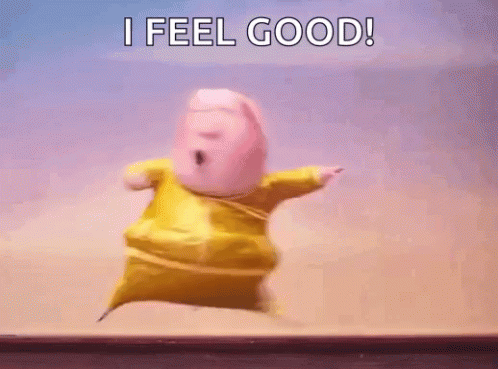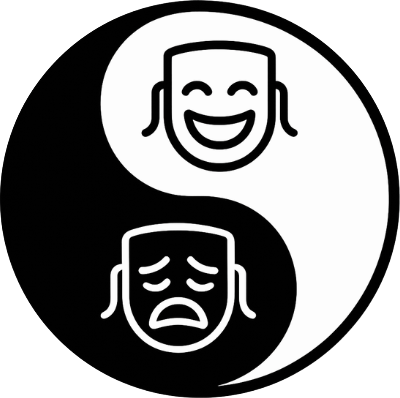Peak Experience Matters, Too
Given that the Dojo has pioneered evidence-informed actor thriving (i.e., peak performance + holistic well-being) training worldwide since 2019, the following statement may seem completely self-defeating. Ready?
Peak performance isn't everything. It's cool, no doubt, and a worthy endeavour, but it isn't everything. Our experience matters, too.
Fortunately, that isn't an entirely Dojo-defeating statement, and fortunately, peak performance and peak experience don't have to be arch nemeses. They can coexist. And, possibly, it's in our interest they do.
Backed by science; built for the stage and screen.
👊 Actors:
Get evidence-informed insights and strategies to support your performance and well-being. Join the Dojo e-newsletter tribe and make thriving your reality.
🧭 Drama schools & Production companies:
Bring pioneering, research-backed coaching into your classroom or rehearsal room. Let's talk about supporting your actors to perform at their peak – and stay well in the process.
Science says
A central tenet of the Dojo's crusade is that acting could gain a lot from a little "science". Making peak performance concrete is one such example.
If you haven't yet read that article, two key takeaways were:
- Definitions of peak performance exist![1] Our field could be less ambiguous about this. Clarity is kindness.
- There is evidence to suggest that the most effective "tools" for achieving peak performance are mindfulness- and acceptance-based modalities.[2] [3]
The first point was unpacked in detail in the abovementioned article (a 3-minute read), so we'll focus on the second, more nuance-y point here.
If you're a long-time reader / have worked with us 1-On-1 / have had us visit your drama school, you've probably heard us speak about "psychological skills training". If you don't fall into any of those camps, you may have heard athletes or sporting teams reference their use of goal setting, pre-performance routines, mental rehearsal, or self-talk. If you don't fall into that camp either, all good. You now know that goal setting, pre-performance routines, mental rehearsal, and self-talk are OG psychological skills training.[4] [5] [6]
Without going tooooo far down a research rabbit hole, more recent studies show that OG psychological skills training might not be as effective at enhancing objective performance as was once thought. And not when compared to mindfulness- and acceptance-based modalities.[7] [8] [9] [10]
But – and this is critical to our argument here – OG psychological skills training still seems to demonstrate potential for a significant effect on subjective experience (e.g., decreasing anxiety, increasing confidence).[11] [12] [13] [14]
Also true
Ironically, part of what makes peak performance so alluring is the array of feelings we expect we'll feel after reaching it. That is, our desire for enhanced objective performance is partially fuelled by a desire for enhanced subjective experience anyway.
Further, if we aren't experiencing any positive feels in the process, we mightn't even reach the stage where peak performance becomes possible. Peak performance requires reps, and reps require that we haven't tapped out.
Consider, for example, a typical 11-month West End contract.[15] Across the length of this contract, we could perform over 350 times (11 months × 4 weeks × 8 shows = 352 performances). Provided that we understand we don't need to feel good to "perform" good, it's understandable that we might want to increase the probability that that we do, nonetheless. After all, 350 performances in less than a calendar year is a non-trivial commitment.
What does this all mean in practice?
Yes, by all means, let's lead with mindfulness- and acceptance-based modalities in the pursuit of peak performance. And let's leave OG psychological skills training on the table to help foster peak experience, too. This needn't be an either / or; in true actor fashion, this can be a "yes, and...".

Excellence and enjoyment aren't inherently mutually exclusive. Remember, we only get one ride at this rodeo (as far as we know), so we may as well enjoy it occasionally 🤸
TL;DR?
No worries. Here are the three key takeaways:
- Peak experience matters at least as much as peak performance.
- Reaching peak experience is a primary reason we strive for peak performance in the first place.
- OG psychological skills training appears to have a significant effect on peak experience.
Love what you're reading? Help us keep it flowing. Donations support the research, writing, and free sharing of evidence-informed tools for actor performance and well-being. Every dollar fuels our mission to make thriving a reality for actors everywhere 🔥
Citations
[1] [4] https://doi.org/10.1123/tsp.6.2.156 (p. 156)
[3] https://doi.org/10.3390/ijerph20032038
[5] https://doi.org/10.1123/jcsp.3.4.291
[6] https://amzn.to/4j3SnUT (pp. 171–194)
[7] https://doi.org/10.1123/jcsp.3.4.320
[8] https://doi.org/10.1007/s40279-017-0752-9
[9] https://www.proquest.com/docview/749928047
[10] https://doi.org/10.1007/s12671-019-01098-7
[11] https://amzn.to/3YEBw3I (pp. 11–34)
[12] https://doi.org/10.1007/s12671-012-0109-2
[13] https://doi.org/10.3389/fpsyg.2015.00195
[14] https://doi.org/10.1371/journal.pone.0263408
Cite us!
IG: @theactorsdojo
APA 7: Norrish, T. (2025, May 29). Peak experience matters, too. The Actor’s Dojo. https://www.dojoactors.com/peak-experience/
